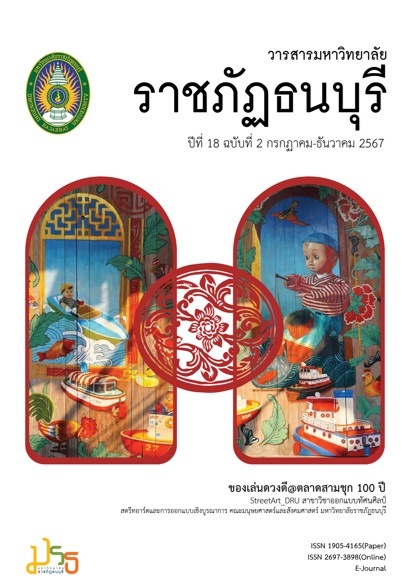Talent Management by Contract-Based Employment to Create Flexibility of Talent Retention in the Thai Automotive Industry: A Case Study of Eastern Region
Keywords:
Talent management, Contract-based employment, Automotive industryAbstract
This study was a quantitative study aimed at examining the level of opinions on talent management by contract-based employment to create flexibility in talent retention in the Thai automotive industry. The sample group was determined using Cochran’s sample size formula at a confidence level of 0.05, with a total of 400 people. Data were collected using random sampling methods and analyzed statistically. The study found that 1) overall opinions on the talent management models were at a high level ( = 4.10); 2) overall opinions on human resource management strategies were at a high level ( = 4.05); and 3) overall opinions on the benefits of using contract-based employment were at a moderate level ( = 3.95). The relationship between contract-based employment and different personal factors showed statistically significant differences in opinions on the contract-based employment model at the 0.01 level. The variance of data on contract-based employment models and talent management strategies revealed that in terms of management tools through contract-based employment, reward management, performance management, and managing different growth paths, opinions on contract-based employment models significantly differed at the 0.01 level. Additionally, the variance of data on contract-based employment models and expectation management showed that expectation management regarding the benefits of using contract-based employment, organizational benefits, and personnel benefits differed significantly at the 0.01 level in opinions on the talent management through contract-based employment.
Downloads
References
กรรนภัทรกันแก้ว. (2563). กลยุทธ์การจ่ายค่าตอบแทนกลุ่มคนเก่งและแรงงานข้ามชาติ. สักทอง: วารสารมนุษยศาสตร์และสังคมศาสตร์ (สทมส.). 26(3), น.40-53.
กฤษดา เดชาธิพาโชติ, สักรินทร์ อยู่ผ่อง, วิเชียรเกตุสิงห์และอัคครัตน์ พูลกระจ่าง. (2566). การพัฒนารูปแบบศักยภาพผู้บริหารโรงงานอุตสาหกรรมผลิตอาหารขนาดย่อมเพื่อเพิ่มขีดความสามารถในการแข่งขัน. วารสารศิลปะศาสตร์ราชมงคลสุวรรณภูมิ. 5(1), น. 15-27.
กัญจนวลัย นนทแก้ว แฟร์รี่. (2562). การสร้างความผูกพันต่อองค์กรของเจนเนอเรชั่น ซี.วารสารวิชาการมหาวิทยาลัยฟาร์อีสเทอร์น, 13(3), น. 10-25.
ไกรคุณ กาญจนประภาส และบุญญาดา นาสมบูรณ์.(2564). ทุนมนุษย์และอุปถัมภ์จากองค์กรส่งผลต่อความสำเร็จในอาชีพของ ผู้บริหารระดับกลางชาวไทยในบริษัทวิจัยและพัฒนายานยนต์. วารสารบริหารธุรกิจและภาษา. 9(1), น. 54-71.
จิรเมธ จันทโชติ, จิรัฏฐภัทร ทราฤทธิ์และกัมปนาท วงษ์วัฒนพงษ์. (2565). จากมุมมองการบริหารผลงาน การบริหารคนเก่งสู่แนวทางการบริหารทรัพยากรมนุษย์. Journal of Roi KaensarnAcademi. 7(12), น. 450-465.
ธนเนศ ยุคันตวนิชชัย.(2559). การจัดการคนเก่งในกระแสโลกาภิวัตน์.วารสารมหาวิทยาลัยคริสเตียน. 22(4), น.1-13.
พฤกษ์สุพรรณาลัย, จิราวรรณ ฤงฤล้ายและเฉลิมชัย กิตติศักดิ์นาวิน. (2560). การรักษาคนเก่งโดยการให้รางวัล. วารสารบัณฑิตศึกษา มหาวิทยาลัยราชภัฏวไลยอลงกรณ์ ในพระบรมราชูปถัมภ์. 2(11),
น. 241-250.
พงศ์ศรัณย์ อัศวชัยโสภณ และพัชรพร ลีพิพัฒน์ไพบูลย์.(2561). เมื่อโลกกำลังทำสงครามแย่งชิงคนเก่ง ประเทศไทยทำอะไรอยู่. ฝ่ายนโยบายโครงสร้างเศรษฐกิจ ธนาคารแห่งประเทศไทย.ค้นเมื่อวันที่ 30 ตุลาคม 2566, จาก https://www.bot.or.th/Thai/ResearchAndPublications/articles/Pages/ Article_30Oct2018.aspx.
วิจิตรา ยาวิเลิง, จีรภามิ่งเชื้อและธนัสถา โรจนตระกูล. (2564). แนวทางการจัดการทรัพยากรมนุษย์ที่มีความสามารถพิเศษในมิติการสรรหา การพัฒนา และการธ ารงรักษาขององค์กรภาคเอกชนและองค์กรภาครัฐวิสาหกิจ. วารสารนิติศาสตร์ รัฐศาสตร์ และสังคมศาสตร์ มหาวิทยาลัยราชภัฎเชียงราย. 5(2), น. 61-81.
ศูนย์สารสนเทศ สถาบันยานยนต์. (2562). ผู้ผลิตรถยนต์ในประเทศ. ค้นเมื่อวันที่ 31 ตุลาคม 2566 , จากhttps://data.thaiauto.or.th/auto/auto-manufacturer/auto-value-chain/auto-manufacturer-19.html.
Cochran, W.G. (1953) Sampling techniques. 3rd Edition. Wiley.
Milkovich, G. T., Newman, J. M., & Milkovich, C. (2002). Compensation. (8 ed). New York: McGraw-Hill.
Nunnally, J. C., & Bernstein, I. H. (1994). Psychometric theory. (3rd ed.). New York: McGraw-Hill.
Lewis, R. E., & Heckman, R. J. (2006). Talent management: A critical review. Human resourcemanagement review. 16(2), 138-154.
Downloads
Published
How to Cite
Issue
Section
License
Copyright (c) 2024 Dhonburi Rajabhat University

This work is licensed under a Creative Commons Attribution-NonCommercial-NoDerivatives 4.0 International License.
บทความที่ได้รับการตีพิมพ์เป็นลิขสิทธิ์ของ มหาวิทยาลัยราชภัฏธนบุรี
ข้อความที่ปรากฏในบทความแต่ละเรื่องในวารสารวิชาการเล่มนี้เป็นความคิดเห็นส่วนตัวของผู้เขียนแต่ละท่านไม่เกี่ยวข้องกับมหาวิทยาลัยราชภัฏธนบุรีและบุคลากรท่านอื่นๆในมหาวิทยาลัยฯ แต่อย่างใด ความรับผิดชอบองค์ประกอบทั้งหมดของบทความแต่ละเรื่องเป็นของผู้เขียนแต่ละท่าน หากมีความผิดพลาดใดๆ ผู้เขียนแต่ละท่านจะรับผิดชอบบทความของตนเองแต่ผู้เดียว







